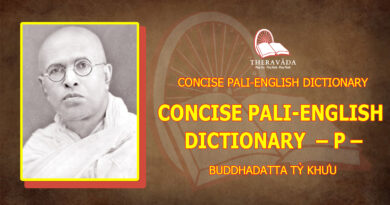Answers By Mr. S. N. Goenka: Metta (loving Kindness)
-What is metta?
Mr. S. N. Goenka: Metta or Metta Bhavana is the technique of generating vibrations of goodwill and compassion that a Vipassana student is first taught on the 10th day of a 10-day Vipassana course. Later, at the end of every Vipassana course, or a 1-hour sitting, a meditator is asked to practice metta, to share the merits gained with all beings. Metta vibrations are tangible vibrations whose beneficial power increases as the purity of the mind increases.
-Is mettā some sort of energy? Is it limitless? Does the amount of mettā increase and decrease over time?
Mr. S. N. Goenka: Well, every individual generates mettā. So it increases and decreases according to the capacity of the individual. If the individual becomes purer and purer, the mettā becomes stronger and stronger. If the mind of the meditator is very weak or full of impurity, then the mettā is very weak. It is generated by the meditator.
-Does metta get stronger as samadhi (concentration) gets stronger?
Mr. S. N. Goenka: Yes. Without samadhi, the metta is really no metta. When samadhi is weak, the mind is very agitated, and it is agitated only when it is generating some impurity, some type of craving or aversion. With these impurities, you cannot expect to generate good qualities, vibrations of metta, or karuna (compassion). It isn’t possible. At the vocal level, you may keep on saying “Be happy, be happy’, but it doesn’t work. If you have samadhi then your mind is calm and quiet, at least for a moment. It is not necessary that all the impurities have gone away; but at least for that moment when you are going to give metta, your mind is quiet, calm, and not generating any impurity. Then whatever metta you give is strong, fruitful, beneficial.
-Is the generation of metta a natural consequence of the purity of the mind, or is it something that must be actively developed? Are there progressive stages in metta?
Mr. S. N. Goenka: Both are true. According to the law of nature – the law of Dhamma – as the mind is purified, the quality of metta develops naturally. On the other hand, you must work to develop it by practicing Metta Bhavana. It is only at a very high stage of mental purity that metta is generated naturally, and nothing has to be done, no training has to be given. Until one reaches that stage, one has to practice. Also, people who don’t practice Vipassana can practice Metta Bhavana. In such countries as Burma, Sri Lanka and Thailand, Metta Bhavana is very common in every household. However, the practice is usually confined to mentally reciting “May all beings be happy, be peaceful”. This certainly gives some peace of mind to the person who is practicing it. To some extent good vibrations enter the atmosphere, but they are not strong. However, when you practice Vipassana, purification starts. With this base of purity, your practice of Metta naturally becomes stronger. Then you won’t need to repeat these good wishes aloud. A stage will come when every fiber of the body keeps on feeling compassion for others, generating goodwill for others.
-How does mettā help in the development of muditā (sympathetic joy) and kārunā (compassion)?
Mr. S. N. Goenka: Muditā and kārunā naturally follow as one develops mettā. Mettā is love for all beings. Mettā takes away the traces of aversion, animosity and hatred toward others. It takes away the traces of jealousy and envy toward others.
What is muditā? When you see other people progressing, becoming happier, if your mind is not pure, you will generate jealousy toward these people. “Why did they get this, and not I? I’m a more deserving person. Why are they given such a position of power, or status? Why not I? Why have they earned so much money? Why not I?” This kind of jealousy is the manifestation of an impure mind.
As your mind gets purer by Vipassana and your mettā gets stronger, you will feel happy when seeing others happy. “All around there is misery. Look, at least one person is happy. May he be happy and contented. May he progress in Dhamma, progress in worldly ways.” This is muditā, sympathetic happiness. It will come.
Similarly, when you find somebody suffering, kārunā automatically arises if your mind is pure. If you are an ego-centred person, full of impurities, without the proper practice of Vipassana, without mettā, then seeing someone in trouble doesn’t affect you. You don’t care; you are indifferent. You try to delude yourself saying, “Oh, this fellow is suffering because of his own karma. How can I do anything about it?” Such thoughts show that the mind is not yet pure. If the mind becomes pure and mettā develops, hardness of heart cannot stay; it starts melting. You see people suffering and your heart goes out to them. You don’t start crying; that’s another extreme. Rather, you feel like helping such people. If it is within your means, you give some tangible help. Otherwise, at least you help with your vibrations: “May you be happy. May you come out of your misery. “Even if you have no material means to help somebody, you always have this spiritual means.
-What is true compassion?
Mr. S. N. Goenka: It is the wish to serve someone, to help him come out of suffering. But it must be without attachment. If you start crying over the suffering of another, you have no real compassion for that person, you only make yourself unhappy. This is not the path of Dhamma. If you have true compassion, then with all love you try to help others to the best of your ability. If you fail, you smile and try another way to help. You serve without worrying about the results of your service. This is real compassion, proceeding from a balanced mind.
Source: https://www.vridhamma.org






